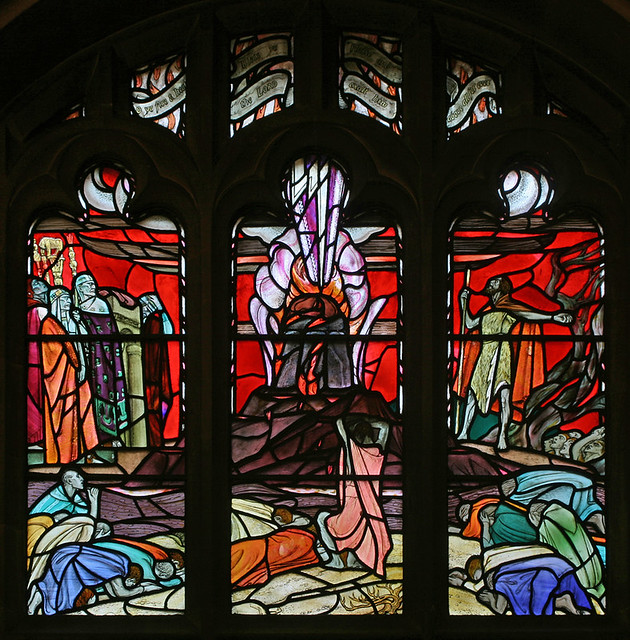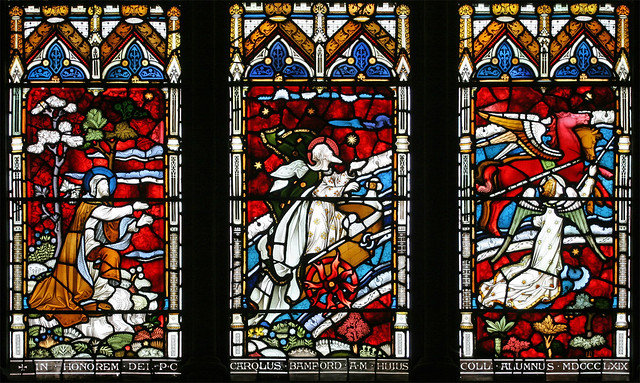John 3
10Jesus told Nicodemus, “You’re a well-known teacher of Israel. Can’t you understand this? 11I can guarantee this truth: We know what we’re talking about, and we confirm what we’ve seen. Yet, you don’t accept our message. 12If you don’t believe me when I tell you about things on earth, how will you believe me when I tell you about things in heaven? 13No one has gone to heaven except the Son of Man, who came from heaven.
14“As Moses lifted up the snake on a pole in the desert, so the Son of Man must be lifted up. 15Then everyone who believes in him will have eternal life.”
16God loved the world this way: He gave his only Son so that everyone who believes in him will not die but will have eternal life. 17God sent his Son into the world, not to condemn the world, but to save the world. 18Those who believe in him won’t be condemned. But those who don’t believe are already condemned because they don’t believe in God’s only Son.
19This is why people are condemned: The light came into the world. Yet, people loved the dark rather than the light because their actions were evil. 20People who do what is wrong hate the light and don’t come to the light. They don’t want their actions to be exposed. 21But people who do what is true come to the light so that the things they do for God may be clearly seen.
2) This gospel has the single most important line of the bible to many Christians, and especially to many evangelists. Can you guess which it is? Why that verse?
St. Patrick is so famous that he has become more mythical than historical. Yet he is in many ways the key person responsible for converting a whole country to Christianity, that later contributed a great many saints and helped preserve the bible through the dark ages.
As a boy, Patrick was kidnapped and taken from Britain to Ireland as a slave. Amazingly, 1600 years later we still have his short autobiography, The Confession of Saint Patirck. He writes:
16. But after I reached Ireland I used to pasture the flock each day and I used to pray many times a day. More and more did the love of God, and my fear of him and faith increase, and my spirit was moved so that in a day I said from one up to a hundred prayers, and in the night a like number; besides I used to stay out in the forests and on the mountain and I would wake up before daylight to pray in the snow, in icy coldness, in rain, and I used to feel neither ill nor any slothfulness, because, as I now see, the Spirit was burning in me at that time.3) Would you set across the country in response to a voice in a dream? What does this tell you about Patrick?
17. And it was there of course that one night in my sleep I heard a voice saying to me: ‘You do well to fast: soon you will depart for your home country.’ And again, a very short time later, there was a voice prophesying: ‘Behold, your ship is ready.’ And it was not close by, but, as it happened, two hundred miles away, where I had never been nor knew any person. And shortly thereafter I turned about and fled from the man with whom I had been for six years, and I came, by the power of God who directed my route to advantage (and I was afraid of nothing), until I reached that ship.
Later as an adult he came back to Ireland, and wrote this about it:
37. And many gifts were offered to me with weeping and tears, and I offended them [the donors], and also went against the wishes of a good number of my elders; but guided by God, I neither agreed with them nor deferred to them, not by my own grace but by God who is victorious in me and withstands them all, so that I might come to the Irish people to preach the Gospel and endure insults from unbelievers; that I might hear scandal of my travels, and endure many persecutions to the extent of prison; and so that I might give up my free birthright for the advantage of others, and if I should be worthy, I am ready to give even my life without hesitation; and most willingly for His name. And I choose to devote it to him even unto death, if God grant it to me.4) Why was it worth all that suffering to him to tell people about God?
38. I am greatly God’s debtor, because he granted me so much grace, that through me many people would be reborn in God, and soon after confirmed, and that clergy would be ordained everywhere for them, the masses lately come to belief, whom the Lord drew from the ends of the earth, just as he once promised through his prophets: ‘To you shall the nations come from the ends of the earth, and shall say, “Our fathers have inherited naught but lies, worthless things in which there is no profit.”’ And again: ‘I have set you to be a light for the Gentiles that you may bring salvation to the uttermost ends of the earth.’
5) After all he did, why would he consider himself in debt to God?
The end of the confession:
62. But I entreat those who believe in and fear God, whoever deigns to examine or receive this document composed by the obviously unlearned sinner Patrick in Ireland, that nobody shall ever ascribe to my ignorance any trivial thing that I achieved or may have expounded that was pleasing to God, but accept and truly believe that it would have been the gift of God. And this is my confession before I die.6) I love this turn of phrase, giving credit to God for anything good we’ve managed, and taking the blame for the mistakes that are our own. I heard a muslim leader recently close with a very similar sentiment. Can you see any danger in starting to take credit for your successes?
Part of his famous prayer, St. Patrick’s Breastplate:
Christ to shield me today
Against poison, against burning,
Against drowning, against wounding,
So that there may come to me abundance of reward.
Christ with me, Christ before me, Christ behind me,
Christ in me, Christ beneath me, Christ above me,
Christ on my right, Christ on my left,
Christ when I lie down, Christ when I sit down, Christ when I arise,
Christ in the heart of every man who thinks of me,
Christ in the mouth of everyone who speaks of me,
Christ in every eye that sees me,
Christ in every ear that hears me.
I arise today
Through a mighty strength, the invocation of the Trinity,
Through belief in the threeness,
Through confession of the oneness,
Of the Creator of Creation.
7) Patrick is maybe most famous for his teaching about the Holy Trinity. How do you think about the Father, Jesus and the Holy Spirit being one God?
References:
The Confession of St. Patrick http://www.ccel.org/ccel/patrick/confession
The post by Sharon Pearson at Building Faith that got me thinking of this http://www.buildfaith.org/2012/03/15/patrick-of-ireland/
The hymn of the Breastplate:




